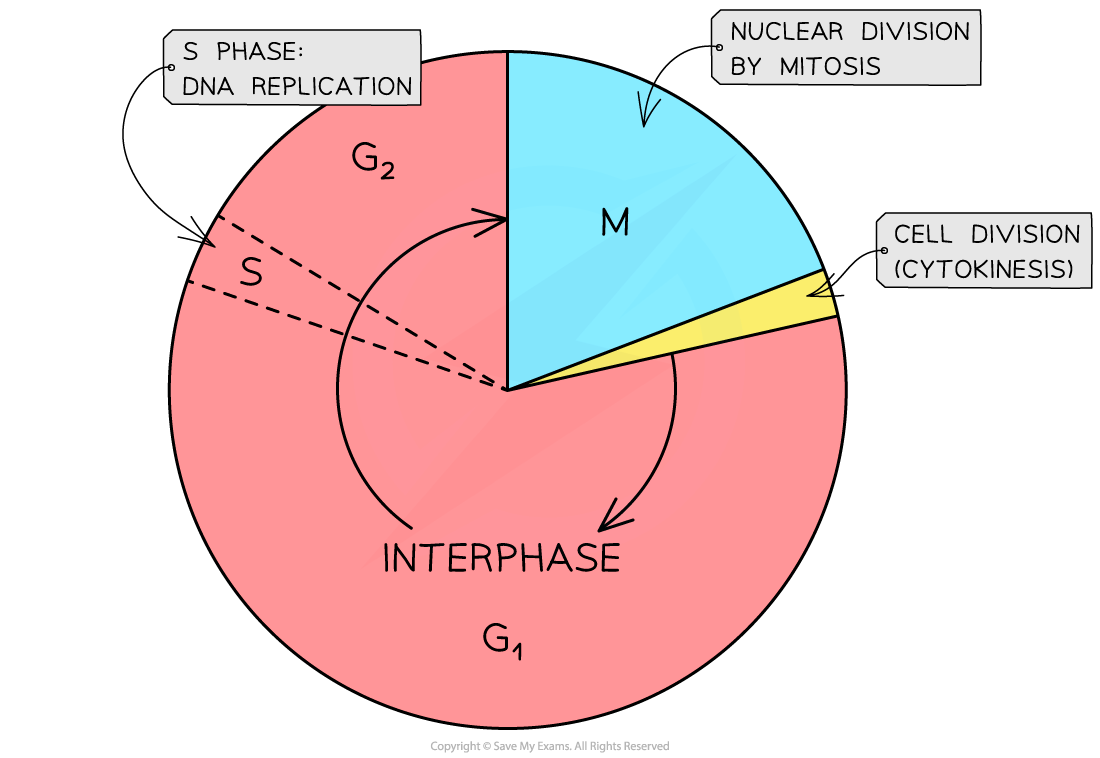The Cell Cycle (Cambridge (CIE) AS Biology) : Revision Note
The Cell Cycle
Mitosis is part of a precisely controlled process known as the cell cycle
The cell cycle is the regulated sequence of events that occurs between one cell division and the next
The cell cycle has three phases:
interphase
nuclear division (mitosis)
cell division (cytokinesis)
The length of the cell cycle is very variable depending on environmental conditions, the cell type and the organism
For example, onion root tip cells divide once every 20 hours (roughly) but human intestine epithelial cells divide once every 10 hours (roughly)
The movement from one phase to another is triggered by chemical signals called cyclins
The Cell Cycle Diagram

The cell cycle consists of different phases. Note the following abbreviations: S = synthesis (of DNA); G = gap; M = mitosis
Interphase
During Interphase the cell increases in mass and size and carries out its normal cellular functions (e.g. synthesising proteins and replicating its DNA ready for mitosis)
Interphase consists of three phases:
G1 phase
S phase
G2 phase
It is at some point during the G1 phase that a signal is received telling the cell to divide again
The DNA in the nucleus replicates (resulting in each chromosome consisting of two identical sister chromatids)
This phase of the interphase stage of the cell cycle is called the S phase – S stands for synthesis (of DNA)
The S phase is relatively short
The gap between the previous cell division and the S phase is called the G1 phase – G stands for gap
Cells make the RNA, enzymes, and other proteins required for growth during the G1 phase
Between the S phase and the next cell division event the G2 phase occurs
During the G2 phase, the cell continues to grow and the new DNA that has been synthesised is checked and any errors are usually repaired
Other preparations for cell division are made (e.g. production of tubulin protein, which is used to make microtubules for the mitotic spindle)
Interphase = G1 + S + G2
Nuclear division (mitosis)
Follows interphase
Referred to as the M phase – M stands for mitosis
Cell growth stops during the M phase
During mitosis, the nucleus divides to form two genetically identical nuclei
Cytokinesis
Follows M phase
Once the nucleus has divided into two genetically identical nuclei, the whole cell divides and one nucleus moves into each cell to create two genetically identical daughter cells
In animal cells, cytokinesis involves constriction of the cytoplasm between the two nuclei and in plant cells a new cell wall is formed
Examiner Tips and Tricks
Make sure you know the order of the phases of the cell cycle but also what specifically occurs during the different phases. Don’t forget, interphase is itself made up of three distinct stages (G1, S and G2) and you need to know what happens during each of these.For example, an exam question might ask you to identify the stage of the cell cycle during which a cell would be producing the most mRNA molecules and explain why. The correct answer would be the G1 phase, as this is when protein synthesis is occurring and the production of mRNA occurs during transcription (the first part of protein synthesis).

You've read 0 of your 5 free revision notes this week
Sign up now. It’s free!
Did this page help you?
